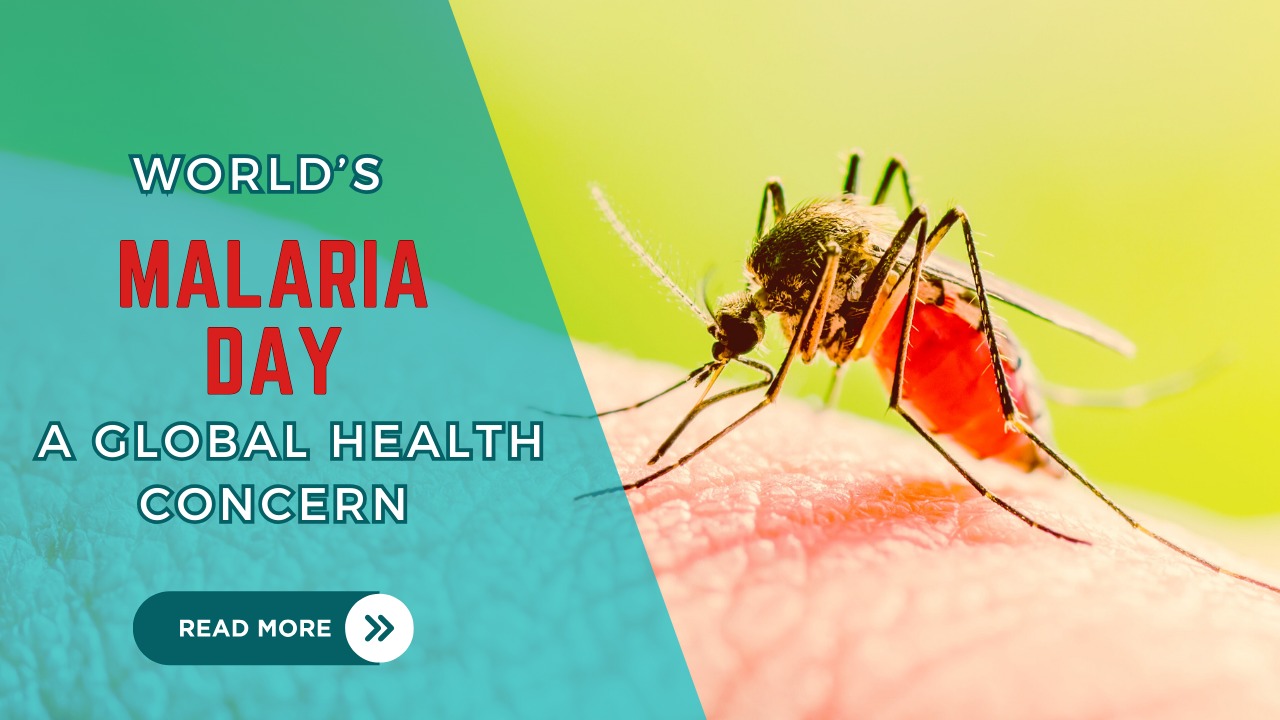World’s Malaria Day is commemorated annually on April
25th to emphasize the ongoing battle against malaria, one of the most ancient
and lethal diseases worldwide. In the year 2024, the focus remains steadfast on
addressing this significant health challenge and acknowledging the strides made
in combatting malaria.
Malaria:
A Lethal Vector-Borne Disease
Malaria continues to pose a substantial threat as a deadly disease primarily transmitted through mosquito bites. This disease remains prevalent in various regions, with notable impact seen in places like India, where environmental and socioeconomic factors contribute to its widespread occurrence and transmission.
In
Gwalior: High Prevalence of Malaria
Factors Behind High Prevalence
Gwalior faces significant malaria rates due to its warm climate, rapid urbanization, and socioeconomic factors, fostering mosquito breeding grounds.
Addressing the Challenges
Access to timely diagnosis and treatment remains a hurdle, alongside the need for continuous education on preventive measures like bed nets and sanitation.
Multi-Faceted Control Efforts
Government initiatives, collaboration with NGOs, and technological advancements are key strategies in controlling malaria, focusing on vector control and community engagement.
Renewed Commitment to a Malaria-Free Future
On World Malaria Day, let's reinforce our commitment to eliminating malaria in Gwalior through targeted interventions and collective action.
Significance
of World Malaria Day
The establishment of World Malaria
Day in 2007 by the World Health Organization (WHO) holds profound significance
in raising awareness and mobilizing global actions against malaria. This
observance garners political support, fosters collaboration among diverse stakeholders, and promotes collective efforts towards malaria prevention
and control.
World
Malaria Day 2024 Theme
The theme for World Malaria Day
2024, "Time to deliver zero malaria: invest, innovate, implement,"
encapsulates the urgent need for comprehensive strategies aimed at eliminating
malaria. This theme underscores the importance of strategic investments in
healthcare infrastructure, innovative research, and effective implementation of
prevention measures to achieve the ambitious goal of zero malaria cases.
Importance
of World Malaria Day
World Malaria Day is pivotal in
mobilizing resources, garnering political commitment, and promoting innovation
in the fight against malaria. By maintaining malaria as a global health
priority, this day ensures sustained efforts in managing and eradicating the
disease while fostering awareness and collaboration on a global scale.
Spread
and Prevention of Malaria
Malaria, caused by Plasmodium parasites transmitted
through infected mosquitoes, can be effectively prevented through a
multifaceted approach. Key prevention strategies include:
- Insecticide-Treated Bed Nets (ITNs): These nets, when used while sleeping,
significantly reduce mosquito bites, particularly during peak mosquito
activity hours.
- Indoor
Residual Spraying (IRS): Spraying
insecticides inside homes and buildings helps reduce mosquito populations
and halt disease transmission in endemic areas.
- Chemoprevention: Administering preventive antimalarial
treatments, especially to vulnerable populations like pregnant women and
young children, can inhibit parasite growth and lower infection risks.
- Removal of
Mosquito Breeding Sites: Eliminating
stagnant water sources and implementing proper drainage measures reduces
mosquito breeding grounds, thereby controlling mosquito populations.
- Use of Insect
Repellents: Applying insect repellents containing
effective ingredients like DEET helps prevent mosquito bites and reduces
malaria transmission risks.
- Gambusia Fish: These
small freshwater fish are voracious consumers of mosquito larvae,
effectively reducing mosquito populations in bodies of water where they
reside. Their inclusion in malaria control programs has shown promising
results, particularly where standing water provides breeding
grounds for mosquitoes. can significantly reduce the risk of
mosquito-borne diseases like malaria.
India Malaria Program
The India Malaria Control Program,
now the National Vector Borne Disease Control Programme (NVBDCP), has evolved
since the 1950s. Initially focusing on DDT spraying, it shifted to
comprehensive strategies like bed nets, ACTs, and RDTs. Successes include reduced
cases and deaths, especially in high-risk states like Odisha. Challenges
include drug resistance and remote-area transmission. Key strategies for
success are vector control, early diagnosis with ACTs, robust surveillance, and
community engagement. Despite progress, ongoing efforts and innovation are
needed to meet the goal of malaria elimination by 2030.
Conclusion
On World Malaria Day 2024, the global community reaffirms its commitment to eradicating malaria, envisioning a future free from this debilitating disease. Through collective efforts, strategic investments, and ongoing innovation, we strive to create a healthier world where malaria no longer poses a threat to communities worldwide.











